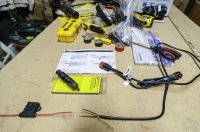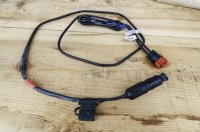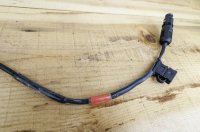TWS
New Member
greetings and thanks for an instructive forum,
i am trying to figure out the best way to wire a marine grade cigarette plug to the power leads from a fishfinder.
mind you, this cable is in the busy fishy environment of an open aluminum skiff. further i need the unit to be portable.
i can not tell the gauge wire but it is tinned and presumably marine grade. see picture. i must add an inline 3 amp fuse holder to the red power lead. i'd like to extend the over all cable by a foot - from the fuse holder. this will give me ample room to adjust my clamp on gps/fishfinder to the gunnel with length of cable to a marine 12v deep cycle battery place just forward of my middle seat.
i have a soldering iron and solder... i haven't soldered in a long time. i was hoping to somehow solder the leads together or solder AND some kind of connector and MOST important cover the lot with shrink tubing to seal it from wind, waves and rain.
can anyone explain the best way to do this and suggest the right wire and components to make a sturdy but water proof extension to this cable?
thank you,
mforrest
i am trying to figure out the best way to wire a marine grade cigarette plug to the power leads from a fishfinder.
mind you, this cable is in the busy fishy environment of an open aluminum skiff. further i need the unit to be portable.
i can not tell the gauge wire but it is tinned and presumably marine grade. see picture. i must add an inline 3 amp fuse holder to the red power lead. i'd like to extend the over all cable by a foot - from the fuse holder. this will give me ample room to adjust my clamp on gps/fishfinder to the gunnel with length of cable to a marine 12v deep cycle battery place just forward of my middle seat.
i have a soldering iron and solder... i haven't soldered in a long time. i was hoping to somehow solder the leads together or solder AND some kind of connector and MOST important cover the lot with shrink tubing to seal it from wind, waves and rain.
can anyone explain the best way to do this and suggest the right wire and components to make a sturdy but water proof extension to this cable?
thank you,
mforrest



